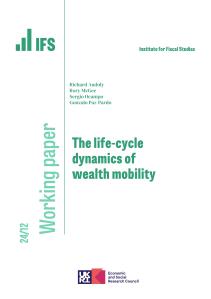How do average levels of income and wealth differ in Britain for those born between the 1930s and 1980s? The 1980s cohort are the first post-war generation not to have higher median incomes in their early 30s that those born a decade earlier, though they have much higher incomes than those born in the 1960s and earlier. Median wealth for the 1980s cohort is 20% lower in their early 30s than it was for those born in the 1970s: driven by lower property wealth and homeownership – 40% at age 30 for 1980s cohort, compared to 55% for the 1970s cohort.
Authors

Associate Director
Jonathan is an Associate Director and Head of Retirement, Savings and Ageing sector, focusing on pensions, savings and later-life economic activity.
Journal article details
- DOI
- 10.1111/1475-5890.12202
- Publisher
- Wiley
- Issue
- Volume 40, Issue 3, October 2019, pages 275-299
Suggested citation
Cribb, J. (2019). 'Intergenerational differences in income and wealth: evidence from Britain' 40(3/2019), pp.275–299.
More from IFS
Understand this issue

Raising revenue from closing inheritance tax loopholes
18 April 2024

Why inheritance tax should be reformed
18 January 2024

The future of the state pension
21 December 2023
Policy analysis

Recent trends in public sector pay
26 March 2024

Gap between higher- and lower-paid public sector workers falls by more than a third since 2007 as doctors and experienced teachers have faced unprecedented pay cuts
26 March 2024

Reforming the taxation of non-doms: policy options and uncertainties
4 March 2024
Academic research

Labour market inequality and the changing life cycle profile of male and female wages
15 April 2024

Interpreting cohort profiles of lifecycle earnings volatility
15 April 2024

The life-cycle dynamics of wealth mobility
10 April 2024